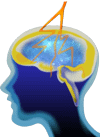Dementia Treatment in Mumbai
Dementia
Dementia is a collection of symptoms related to mental and social deterioration that interfere with the patient’s everyday activities. Dementia is defined as the impairment of two or more brain processes such as memory, language, thinking, judgment, and so on. Memory loss is a typical symptom of dementia; however, not all memory loss is associated with dementia. It might be caused by a single medical condition or by a combination of medical conditions. Every year, more than 10 million instances of dementia are discovered in India. It can be treated after it has occurred, but it cannot be totally healed. If you suffer from Dementia and need immediate treatment Call our expert Dr. Amit Shah on 9819561456.What are the Dementia types?
- Alzheimer’s disease patients have plaques and tangles in their brains. Plaques are clumps of a protein called beta-amyloid, and tangles are fibrous tangles made up of tau protein. It’s thought that these clumps damage healthy neurons and the fibers connecting them.
- Frontotemporal dementia: This is a group of diseases characterized by the breakdown of nerve cells and their connections in the frontal and temporal lobes of the brain.
- Cortical dementia affects just the brain’s outer layer (cortex).
- Subcortical dementia affects the cortex’s lowest layer.
- Progressive dementia- This disorder worsens with time, gradually producing a greater impediment to cognitive ability.
- Primary dementia is not a consequence of any other disease
- Secondary dementia developed as a result of a physical injury
- Progressive dementia-People with Alzheimer’s disease, Lewy body dementia, and vascular dementia are more likely to develop progressive dementia. Alzheimer’s disease is the most frequent kind of degenerative dementia.
Who is affected by Dementia?
The majority of dementia patients are elderly, however it is crucial to realize that not all elderly persons get dementia. It is not a typical aspect of the ageing process. Dementia may occur at any age, although it is more frequent after the age of 65. Dementia may also affect people in their 40s and 50s.
Symptoms and Signs
Memory loss, communication difficulties, disorientation, difficulty in concentration, focus, and thinking, difficulty in completing tasks, mood changes, loss of initiation, personality changes, misplacement of things, loss of visual perception, loss of reasoning and judgement are all signs and symptoms of dementia. Dementia symptoms might vary from person to person.
Treatment
Memory loss, communication difficulties, disorientation, difficulty in concentration, focus, and thinking, difficulty in completing tasks, mood changes, loss of initiation, personality changes, misplacement of things, loss of visual perception, loss of reasoning and judgement are all signs and symptoms of dementia. Dementia symptoms might vary from person to person.
- Donepezil, Alantamine, Rivastigmine, and Tacrine may be used to relieve some of the symptoms temporarily. These drugs may be used to alleviate the symptoms of Alzheimer’s disease.
- An NMDA receptor antagonist (Memantine) may also be administered in conjunction with a cholinesterase inhibitor to alleviate dementia symptoms. Cholinesterase inhibitors may help to reduce the behavioral issues associated with Parkinson’s disease.
- “Brain training” sessions may help improve cognitive performance in the early stages. Memory aids, such as electronic recall devices, may assist patients to improve their memory.
For more information & consultation on Dementia treatment, Call our expert Dr. Amit Shah – Consultant Neurologist in Mumbai on 9819561456 or Book an Appointment

